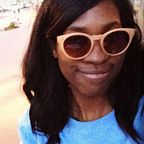What’s good, Medium? Halloween edition
10–31- 2016
It’s Halloween so that means your favorite costumed figures are emerging from the shadows. Yes, Rachel Dolezal is back, this time promoting her forthcoming memoir. Son of Baldwin breaks down this giant ball of problematic:
Some black academics are fascinated by her because they believe she disturbs racial realities and reveals race for the fictitious construct it is. They have little to say about how no brown-skinned black woman would be similarly allowed to disturb racial constructs by claiming she’s white, no matter how much bleaching cream is involved. Instead, she’d be called every name in the book and shunned. If the glove cannot be turned inside out, as Toni Morrison would say, then the entire enterprise is a sham. I mean, she sued Howard University, claiming she was discriminated against for being white.
That, to me, reveals how Whiteness girds everything Dolezal does, from being able to co-opt black women’s identities with relative ease to having some black people cumming on themselves to allow her to be down. No person that we actually believed was black could have such access. That’s how I know that these Dolezal supporters don’t really believe she’s black at all. They just like that she gives “woke” people the ability to disguise the fact that they truly love Whiteness. Eminem took them to the precipice; Dolezal allows them to jump.
K. Austin Collins’ piece on how the scary realities of Black life play out in horror movies:
True horror is cosmic fear. It’s there when I pass by cops at night, or when there’s a Confederate flag waving from the truck of a customer in the same restaurant as me. Horror, as Lovecraft described it, beckons “unexplainable dread.” Keyword: unexplainable. Racism is no mystery. But whether it’s in store, at any given moment, certainly is.
That’s enough to convince me that race and horror shouldn’t be so at odds. Horror is resurgent at the box office — this year especially. Yet, somehow, amid #OscarsSoWhite and other pushes to diversify Hollywood, the genre has largely remained the province of white artists and their white protagonists. Earlier this month, though, comedian and horror aficionado Jordan Peele, formerly of Comedy Central’s Key and Peele, released the first trailer for his upcoming directorial debut, a horror film titled Get Out. It stars Daniel Kaluuya as a man going to meet his white girlfriend’s parents for the first time: Guess Who’s Coming to Dinner, but — if the trailer is any indication — retold through one black man’s inner terror. It isn’t a movie about the perils of the hood, or of the overt racism at a Trump rally, but — even weirder — the terror of middle-class white people.
November starts tomorrow and if you’re a teacher than means you can finally start smiling in class. Matthew R. Morris breaks down the old claim that teachers shouldn’t smile in the classroom until November:
I can’t sit here typing this and lie to you. It is great for me as a teacher when my class sits in complete silence while working through some math questions or a language activity because I explicitly established that expectation in the early weeks of the new school year. Even more troubling, is that I often fail to catch myself when I think that a quiet (the real meaning of compliance in the teacher setting, I guess) is the way that learning ought to be done every day. You know, no communication, every individual for themselves. But real learning cannot happen like this every day of the week. It shouldn’t. Real learning is about banter, spontaneity, challenges and challenging. And yes, real learning even involves breaks that take us back to the reality of acknowledging that we are all tangled in trying to help each other find our best selves. Not smiling sends the opposite message to your students. Real learning ultimately requires inquisitively challenging the norms. And, the “Don’t Smile Until November” mantra is one norm of schooling that must be constantly questioned.
